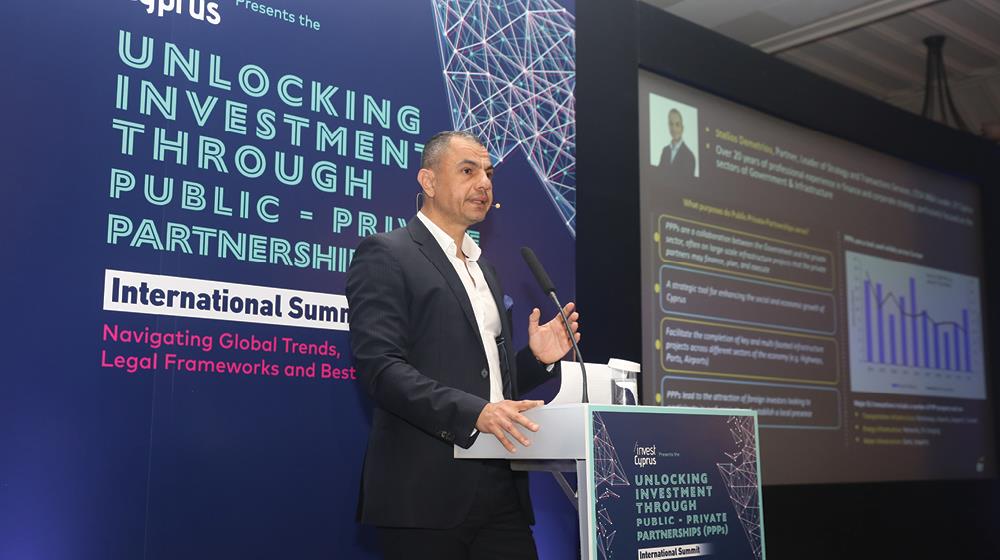Invest Cyprus earlier this year organised an International Summit entitled ‘Unlocking Investment Through Public-Private Partnerships’ in association with the World Association of Investment Promotion Agencies (WAIPA) and the World Association of PPP Units & PPP Professionals (WAPPP).
A publication edition containing an overview of what was discussed during the 26-27 March 2025 Summit, is now available online. You can find it here.
Within the publication,Stelios Demetriou, Partner, Leader of Strategy & Transactions Services and CESA M&A Leader at EY Cyprus argues that the island has all the ingredients for Public-Private Partnership success – except proper delivery.
You can read more below:
When it comes to Public-Private Partnerships (PPPs), Cyprus has ambition, potential and international credibility. What it lacks, according to EY Cyprus Partner Stelios Demetriou, is reliable delivery. Indeed, PPPs are not just an opportunity for Cyprus – they are a necessity. But to make them work, the country must confront its chronic delays, structural bottlenecks and strategic drift.
“PPPs are, without a doubt, a strategic tool for enhancing the socio-economic growth of a country,” Demetriou highlighted. In an era of fiscal constraint and rising demand for infrastructure, PPPs offer a path to modernisation without overburdening the public purse, he noted This is particularly important for smaller economies, where attracting long-term investment often depends on confidence in governance and project pipelines.
Cyprus has the right fundamentals, he argued – geostrategic location, strong legal frameworks and a favourable business climate – yet still lags far behind its European peers in PPP implementation.
Between 2013 and 2024, the EU saw over 500 PPPs launched, totalling around €125 billion in value. These ranged from Italy’s €2.1 billion toll motorway project to the UK’s €1.1 billion low-carbon energy concession in Bristol and water infrastructure projects in the Netherlands. While France, Germany and the UK dominate the leaderboard, even countries like Greece and Italy have advanced their PPP agendas. Cyprus, meanwhile, has failed to register a comparable breakthrough. “We remain well behind our peers,” Demetriou said. “Cyprus is nowhere on the map.”
There’s no shortage of empirical evidence linking infrastructure investment to economic growth. Demetriou referenced research suggesting that each euro spent on infrastructure can generate €1.50 in GDP impact. Sectors like energy and transport – where PPPs are most active – show particularly strong growth multipliers. EY’s own Cyprus Attractiveness Survey echoes that view. Foreign investors see a pressing need to upgrade infrastructure and are eager to participate in transformational projects, if the policy and delivery environment can keep pace. Recent credit rating upgrades – from Moody’s (Aaa) and S&P (A-) – have only bolstered investor sentiment. The conditions for capital deployment are arguably the best in a decade. But the window won’t remain open indefinitely.
Despite this favourable context, Demetriou was blunt about Cyprus’ failures. 2024, he said, was marked not by progress but by paralysis. “Major projects, including the Larnaca Port–Marina concession, the Vasilikos energy terminal, and the long-promised Paphos–Polis road, were delayed yet again.”
Such delays, he warned, send the wrong signals to both the market and the public. Urgently needed upgrades, such as expanding the electricity grid and modernising water systems, remain on hold. This inertia is not solely the fault of the public sector. Complex concession agreements, unrealistic timelines and poor forecasting from private bidders all contribute to a culture of renegotiation and, at times, outright project abandonment.
Demetriou was equally candid about structural issues within the Cypriot administration. There is, he noted, no clear national PPP strategy and ministries often lack the expertise to design and manage complex procurement processes. “Meanwhile, some private-sector participants have failed to meet expectations, focusing too narrowly on profit,” he added.
For Demetriou, without a unified framework and consistent oversight, even well-intentioned projects risk veering off course. Underlying all of this is the need for cultural change. He called for a culture of collaboration, where Cyprus can attract global patterns that share a vision of sustainability and innovation. “We all know that Cyprus needs infrastructure and the Government needs money to deliver it,” he said. “PPPs are the best way to bridge the gap. So let us seize this moment.”
You can also read Demetriou's contribution in the online edition here.









